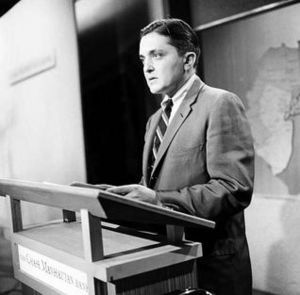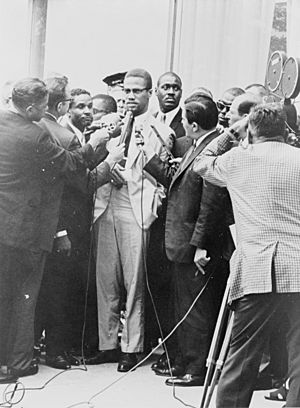Gabe Pressman facts for kids
Quick facts for kids
Gabe Pressman
|
|
|---|---|

Pressman reporting for WNBC-TV in 1957
|
|
| Born |
Gabriel Stanley Pressman
February 14, 1924 Bronx, New York
|
| Died | June 23, 2017 (aged 93) Manhattan, New York
|
| Nationality | American |
| Alma mater | New York University (BA, 1946) Columbia University Graduate School of Journalism (MS, 1947) |
| Occupation | Journalist, TV presenter and reporter |
| Military career | |
| Allegiance | |
| Service/ |
|
| Years of service | 1943–1946 |
| Battles/wars | World War II |
Gabriel Stanley "Gabe" Pressman (February 14, 1924 – June 23, 2017) was a famous American journalist. He worked as a reporter for WNBC-TV in New York City for over 60 years. His career lasted more than seven decades, which is a very long time!
Gabe Pressman covered many huge events. These included the sinking of the Andrea Doria ship in 1956. He also reported on the deaths of JFK and Martin Luther King Jr.. He was there for the Beatles' first visit to the United States. He also covered the attacks on the World Trade Center on 9/11.
He was a pioneer in United States television news. People say he was the first reporter to leave the studio. He went out to major events to report "on-the-scene" from the streets. Pressman was known as the "Dean of New York Journalism." He won many awards, including a Peabody and 11 Emmys. Many people in New York thought he was a true icon.
Contents
Gabe Pressman's Early Life and School Days
Gabe Pressman was born and grew up in the Bronx, New York. His parents were immigrants. His father, Benjamin Pressman, was from Austria. His mother, Lena Rifkin Pressman, was from Russia. His father was a dentist. Later in life, he became a professional magician. He started doing magic tricks to entertain children. He would do this when he taught them about dental care in schools. Gabe also had a younger brother named Paul.
Pressman went to Morris High School. He started journalism at a very young age. When he was 8 or 9, he made a newspaper for his family. It had funny headlines, like "Grandma's Spongecake Made With Real Sponges." Later, he worked as a young reporter. This was for the Peekskill Evening Star newspaper in Peekskill during the summers.
He studied History and Government at New York University. But his studies were stopped by World War II. When he was 19, he joined the U.S. Navy. He served from 1943 to 1946. He was a communications officer. He served on the submarine chaser USS PC-470 in the South Pacific. He took part in the Philippines Campaign.
After the war, Pressman went back to school. He graduated from NYU in 1946. He earned a bachelor's degree. The next year, he graduated from the Columbia University Graduate School of Journalism.
Gabe Pressman's Amazing Journalism Career
After finishing his master's degree in 1947, Pressman worked for a short time. He was a journalist for the Newark Evening News. Columbia University then gave him a special award. It was called a Pulitzer Traveling Fellowship. For the next 15 months, he traveled in Europe. He worked as a freelance journalist. This means he wrote stories for different news groups. He wrote for the Overseas News Agency.
In 1948, he was briefly arrested in Berlin. This happened in the part of the city controlled by the Soviet Union. It showed how much tension was growing between the Soviet government and the West. He was going to the Polish Consulate in Berlin when he was stopped. But he was released after two hours.
He covered many important events in Europe. One was the 1949 trial of Cardinal József Mindszenty. The Cardinal was against the communist government in Hungary. Pressman reported on this for The New York Times. He also reported for Edward R. Murrow's radio show.
Pressman worked for different New York City newspapers. Then, in 1954, he became a reporter for NBC's radio station WNBC. In 1956, he moved to television. Most of his TV career was with NBC. He did leave for seven years, from 1972 to 1979. During that time, he reported for WNEW-TV, Channel 5 (now WNYW).
Since 1945, Pressman covered the lives of many leaders. He reported on 10 New York City mayors. He also covered 10 New York State governors. He reported on 15 Senators from New York. And he covered 13 United States Presidents.
Pressman called himself "just a little Jewish guy from the Bronx." But he became a very well-known person in New York City. Another journalist, Robert D. McFadden, described him. He said Pressman wasn't a "matinee-idol anchorman." But to many people, he was "Gabe." He was the "short, rumpled, pushy guy from Channel 4." He seemed to always be at the scene. He would push his way to the front. He would put his microphone in front of witnesses or important people.

Pressman was a pioneer in "street reporting." He was the first TV journalist to report live from the scene of events. After President Kennedy was shot on November 22, 1963, Pressman went out. He interviewed New Yorkers to get their reactions. He was live among a crowd listening to NBC Radio. That's when the news came that Kennedy had died. Later that night, he reported from a dark Times Square. He interviewed a New York City police officer. They talked about the sad mood in the area.
Pressman was a co-anchor with Bill Ryan. They hosted New York's first early-evening newscast. It was called the Pressman-Ryan Report. This show started because of a big newspaper strike in 1963. He covered the New York area for NBC News, WNBC-TV, and WNBC-AM radio.
The network sent him to report on many historic events. These included the 1956 sinking of the Andrea Doria. He also covered Elvis Presley's time in the Army. He did one-on-one interviews with Marilyn Monroe, Harry S. Truman, and Fidel Castro. He reported on the Beatles' arrival at Kennedy Airport in 1964. He also covered the death of Malcolm X.
He chased after New York mayor John Lindsay in the streets. This was during the 1966 transit strike. He reported on the clashes between protesters and police in Chicago. He also covered the aftermath of the deaths of John F. Kennedy, Robert F. Kennedy, and Martin Luther King Jr.. Pressman was a reporter for NBC News at the Woodstock festival in 1969.
Pressman helped create something called the "perp walk" in New York City. This started in the 1970s. He argued with District Attorney Robert Morgenthau. Pressman wanted to film important suspects after they were arrested. Morgenthau remembered, "Gabe said, 'We need pictures to report your cases,' and I said, 'You're breaking my heart.'"
His fame as a brave reporter was even made fun of in a friendly way. This was on a recording by Bob and Ray. An actor named J.D. Cullum played a reporter named "Gabe Pressman." This was in Billy Crystal's HBO film 61*. In the movie, he reported negatively on baseball player Roger Maris.
He was the president of the New York Press Club from 1997 to 2000. As the head of this group, he fought for the rights of journalists in New York. This included both print and TV reporters.
Until he passed away in June 2017, Pressman still worked part-time at WNBC. He mostly wrote blog posts about New York City news on the station's website. He was also active on Twitter. In 2014, he said that an arthritic knee stopped him from chasing stories like he used to. A few months before he died, he covered the 255th annual Saint Patrick's Day Parade in New York. This was reportedly the last time Pressman was on TV.
Gabe Pressman's Family Life
Pressman was married to Emma Mae Kracht from 1953 to 1967. They had one son and two daughters. In 1972, he married Vera Elisabeth Olsen. She was a psychotherapist. They had another son together.
Gabe Pressman passed away at Mount Sinai Hospital in Manhattan on June 23, 2017. He was 93 years old.
Awards and Recognition
Gabe Pressman received many awards for his work. These included many Emmys and a Peabody Award. He won many of these awards for his reporting. He covered the difficult situation of New York City's homeless population.
- 11 Emmy Awards
- 1958: George Polk Award for Television Reporting
- 1981: Lincoln University's Unity award for "Blacks and the Mayor: How Far Apart?"
- 1982: New York Press Club's Feature Award for "The Homeless"
- 1982: New York State Associated Press Broadcasters Association Award for Excellence in Individual Reporting
- 1982: UPI New York State Broadcasters' Award for Best Feature News Story for "The Homeless"
- 1983: New York Chapter of Professional Journalists, Sigma Delta Chi's Deadline Club Award for "The Hungry"
- 1983: Peabody Award for Asylum In The Streets
- 1983: Deadline Club Award
- 1985: Olive Award for Excellence in Broadcasting
- 1986: New York chapter of NATAS Governors' Award
- 1989: Edward R. Murrow Award
- 2015: Fair Media Council's Folio Lifetime Achievement Award
- 2017: City Limits Urban Journalism Award (given after his death)
 | Victor J. Glover |
 | Yvonne Cagle |
 | Jeanette Epps |
 | Bernard A. Harris Jr. |

